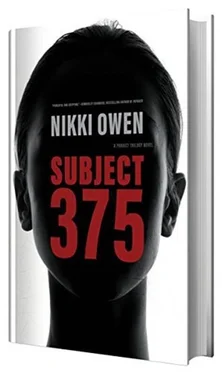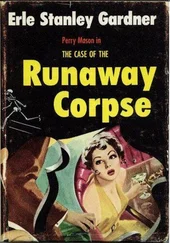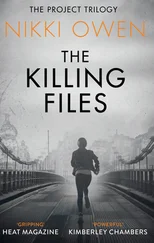‘Bloody hell, Bobbie,’ Patricia says, ‘what did you do?’
I dart my eyes back and forth. The guards are running over now, the room sways, my mind whirring. And that, then, is when I remember: Michaela in the cell. Her accent changed. She was Scottish. Suddenly, like a game of dominoes, all the pieces connect, fall into one another. Bang, bang, bang. She told me to stay put. She knew of Father Reznik. She is Scottish. The medical notes my father found, they were from a hospital in Scotland.
Which means she is not who she says she is.
‘Get up, Doc, quick!’ says Patricia.
My brain engages. I scramble up to a stand and Patricia brushes me down. ‘Let Bobbie handle this,’ she whispers.
The guards run over. They know something is happening, but as far as I can tell, they have seen nothing. No detail.
Bobbie shouts to them. ‘She’s choking! Help us. Quick!’ Then briefly, in the blink of an eye, she turns to me and smiles like someone who has just walked out of an asylum.
Three guards arrive.
‘Help her!’ Bobbie is saying, but she is not looking at the guards, she is looking at me. Bobbie jerks her eyes to Michaela, but I do not understand.
‘Tell the guards,’ says Patricia, fast. ‘Doc, tell the guards what is wrong.’
Now I comprehend. I point to Michaela. ‘She is asphyxiating,’ I say, quickly. The guards hesitate. I crouch to my knees and tug at Michaela’s collar. ‘Her trachea has been restricted. Her airway.’
‘She’s a doctor,’ says Bobbie.
The guard eyes me with suspicion. ‘What was with the raised voices before?’
‘Oh, you know,’ Bobbie says to the guard, ‘high jinx. I think some food might have gone down the wrong way.’
I tilt my head. That is not true. I open my mouth to say so when there is a tug on my blouse. Patricia is glaring at me, a finger on her lips. ‘Ssssh.’
The guard looks at us. ‘All right,’ she says, ‘let’s get Croft checked out.’ She twists to face the dining hall. ‘Show’s over,’ she says, addressing the staring audience of inmates. When no one moves, she yells, ‘Bugger off. Now. Or you’ll find your TV privileges revoked.’
The inmates grumble, shuffling off, and I watch as Michaela is led away, her feet dragging along the tiles, face white, small pink fingermarks on her neck.
Patricia whistles. ‘Holy Jesus.’ She turns to me. ‘Doc, you okay?’
I nod.
‘Then let’s go.’
I start to follow her when I feel a tap on my shoulder. I turn. Bobbie hands me my notebook. ‘Watch out,’ she says.
‘For what?’ I snatch the writing pad from her.
She steps in closer. ‘Don’t trust anyone, you hear me?’ Her eyes dart left and right. ‘You’re not safe in here. They thought you would be, but now that’s changed. Everything has changed. Someone is after you in here, in the prison.’
‘You do not make sense.’
‘I have instructions to watch you. And I will. But help me. Keep your head down. I’ll watch Croft, make sure she’s kept away from you.’
The accent. The hospital. Can she help? ‘What is Callidus?’ I say. Bobbie goes quiet. ‘Is it a hospital in Scotland? Is that where Mickie Croft is from? Who is she?’
‘MI5.’
The word hangs in the air like a poisonous gas.
‘What?’
Bobbie checks the area. ‘They will kill you. Do you hear me? Kill you. That’s why I’m here, to keep an eye on you. They thought they could keep you in here to be safe and then it all imploded, all broke up, a scandal.’
I try to compute what she is saying. ‘What scandal? Who is “they”?’
She pauses. ‘The Project.’
‘What is that?’
‘I don’t have the clearance to say any more. But what you need to know is the Project will protect you. MI5 won’t.’
I connect it, attempt to put it all together, but it is jumbled like a Rubik’s cube split into multiple colours. MI5? And then I feel it: the sharp needle of realisation. I put my fingers to my mouth, sick at the thought. ‘Was Father Reznik part of this?’
She hesitates then slowly nods. ‘Him, your two previous university professors and your boss at St James’s.’ She pauses. ‘And now? Dr Andersson.’
‘What?’ My head spins, stomach lurches. ‘How?’
‘They were you handlers, Doctor. They were your handlers,’ she says.
‘Handlers? Handlers for what?’ My mind races, pinging from one pinball to another, suddenly frightened. People I thought I could trust, people who were supposed to support me, protect me in some way, were not who they said they were at all. How can Dr Andersson be part of it? None of it makes sense. None of it. I look up to speak to Bobbie, but she is striding away.
‘They were handlers for what?’ I shout.
‘For you, Maria. They were all working for the Project.’
‘What is the Project?’
She keeps walking. ‘Look in your notebook. The answer is there.’
I shake my head, dazed. ‘Answer? What answer?’ I say, calling after her. ‘What answer?’
But she has already gone.
Kurt crosses his legs and presses record on the Dictaphone.
When I ask him if I can perhaps get some fresh air later, he simply narrows his eyes and makes some notes. I look at the coffee cup, worry infecting me like a disease.
A siren wails from outside. He glances up. ‘Tell me, Maria,’ he says, once it has passed, ‘did you ever consider that-’ he consults his notes ‘-Bobbie was make-believing?’
‘What do you mean?’
‘Make-believing-it means pretending, making up a story. Lying.’
‘I…I…’ I halt, inhale. I know she was telling the truth. I have the proof now. I run a finger around my collar. ‘I am warm. Can I have some water?’
He nods, gesturing to the jug. I pour a glass, stall for time. I have found out so much since Bobbie came to me that day, but what do I tell Kurt? He thinks Bobbie was lying. I study him. His body, now, is relaxed, but there is something there, in his eyes, a glint, a flash of something. What? Suspicion? Murkiness? I take another sip, set down the glass. I will see what he has to say first.
‘Maria? What do you think about what I said?’
‘She was not make-believing.’
A small head shake. ‘I thought you might say that.’ He sits forward. ‘The way I view it, we are looking at one of two scenarios here. One: you are, again, recalling information incorrectly, your memory compromised; or two: Bobbie Reynolds was lying because she is a psychopath.’
I grip the seat. The worry creeps higher. ‘It is neither of those. She was telling the truth. I am telling the truth.’
Kurt supplies a brief smile. One, two, three seconds pass. I stay very still, curtains billowing, scared to move, scared to admit what may be happening here.
‘Do you like to be in control, Maria?’ he says suddenly.
I clear my throat, unsure how to answer, uncertain at what he is trying to do. I decide to answer yes.
‘And what does that tell you about yourself?’
‘That I like to be in control, of course.’ Stay calm. Stay calm.
‘Do you think that your need to be in control has shaped your memory?’
My eyes hover over the coffee pot. ‘I…I do not know.’ The coffee. Why did it taste odd earlier?
‘See, here’s what I think. You have trouble with your thoughts and feelings and speaking about them. For people like you, in your situation, it is not uncommon to experience difficulties in relating to, and communicating with, others-for there to be a certain cessation of verbal reasoning, shall we say? You think that if you tell me about your inner feelings, you will lose control over yourself, over your life. Over your future.’
‘No. I have Asperger’s. I feel emotions just like everyone else, I just cannot communicate them. It is nothing to do with control.’ My eyes fix on the coffee cups in front of us.
Читать дальше
Конец ознакомительного отрывка
Купить книгу












